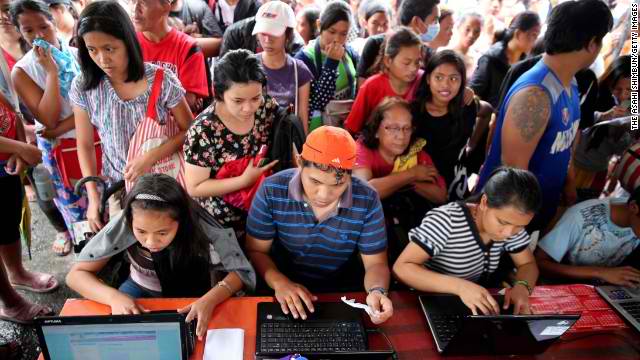
Today, March 29, 2014, the Philippines celebrates the 20th anniversary of our first internet connection.
One way to mark it is to list down important dates from March 29, 1994 as well as the big innovations, big celebrities, big launches, big victories, and big milestones we all won online and offline, thanks to having access to the internet. Of course, we must also try to know the history of PH internet, starting with the efforts spanning many years and involving so many people until we for our first link to the internet.
For me, though, the most lasting and most profound impact of the internet is that we rediscovered we each and all have a voice.
Rediscovering our own voice is a fresh, welcome departure for a nation made to believe that only a few must or should be heard – government, business, the church, media and celebrities.
News, entertainment, punditry or reviews used to come exclusively from traditional media at a time or channel of their own choosing. Not anymore. They are now on-demand, available at any time and across channels, and growing in scope. We have become “reporters” too because, even if the professionals fan out to the most remote places daily, there would still be more sides to the news and entire news to miss and we don’t like that to happen. Bloggers have become reviewers and pundits, and the reviwers enrich the experience with their comments. The power of the crowd, armed with netbooks, tablets, smartphones and the internet, has made media broader and more exciting. Our voices made that happen.
Through the same channels, we no longer accept the old setup of companies and brands speaking down to us and without benefit of feedback. We now want them to listen to us too. We want conversation and interaction. New careers have been born, new companies too, while old ones clinging at the one-way type of communication they have grown to rely on would soon start to remake themselves
Our overseas kababayans used to be completely absent but the internet has given them 24/7 presence in the homeland. Their voices could be heard loud and clear, thanks to social media.
From almost out of nothing, and based mostly on the power of great ideas and a community of supporters and friends, we have formed and continue to form startups – either competing with or helping businesses, big and small. Some have failed, yes. But they don’t give up and are joined by many others in making things happen. Not a few are unsuccessful.
The selfie is a visual manifestation of our hunger for expression. Everyone could be a celebrity in his or her own right, in one’s own social media channel. Indeed, why should an artista grace your phone’s wallpaper when it could be you! In the same way we personalized our phones with icons and themes and covers a decade back, now we “own” our social media and internet accounts, putting a stamp of individuality in each of them, making them our own and thus uniquely Filipino.
This hunger for self-expression in social media has also led to social good. For what else could we do in the face of disasters than to help. And so we tweet and blog about calamities and how to help. Revolted by the shameless corruption of public officers, we rallied online and offline, helping delete PDAF and promoting RH. The power of community, seeds of democracy, small steps forward for social change.
It is this sense of our ownership and changing way of life which explain why we absolutely hate the cybercrime law. We resent, both as individuals and a growing community, the wrong view that the internet and social media are evil. It is really awful to find out that the President, Congress and recently, the Supreme Court, would like to turn back time to the time when they monopolize the right, power and joy of being heard.
Everything’s not rosy and perfect. There’s abuse too that sometimes wounds others. There are also scams and theft. And is unreliable, expensive and limited access to the internet which deny us of huge potentials. Our voices have been clear about these as well: Confront scams and improve services — not at the expense of freedom, but to help promote and expand it.
As we celebrate 20 years of Philippine internet, we look forward to the next 20: Hopefully with better internet that’s wider in reach, faster and more reliable for the world’s social media and selfie capital. Lots of new faces to see, stories to tell, new places to discover, new startups and careers to blossom, new innovations to change lives, new causes to champion.
And maybe in 20 years, we get to earn a new title we long to have: Asia’s most progressive country.
Attend the many events today celebrating #PHNet20 #20PHNet: There’s a forum in Cebu and a TweetUp in Makati, among others.